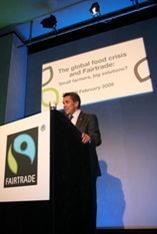
Sainsbury’s has seen a boost in spending on its fairly traded goods at the expense of organics, as the credit crunch leaves its mark on ethical spending.
Speaking at a Fairtrade Foundation conference last week, Sainsbury’s ceo Justin King told delegates: “Downtrading has been a popular phrase, but we are not seeing this. Consumers have actually been taking the cost out of their basket by being very careful with other products and prices, so they can still buy their ethically sourced goods.
“In fact, in the last six months, 18 per cent more of our customers have bought Fairtrade than in the comparable period the previous year.
“Unfortunately, organics have been hit and are in decline, but Fairtrade has not been. We sell 210 million [fairly traded] goods a year and not just in food - we sell Kenyan roses too, for instance.
“We know Fairtrade goods are a little more expensive, but our challenge is to explain to consumers why they pay that premium.”
Fairtrade is not just about customers, according to King, pictured. “Our graduate trainees ask about ethics and Fairtrade before they even ask about the money. They want to know the company’s ethics before anything else,” he said.
Fairtrade accounts for one per cent of all food sales in the UK and accounts for two per cent of Sainsbury’s overall sales at £139m last year, with a target of £200m.
Sainsbury’s has invested considerable sums in its Fairtrade Development Fund to allow farmers to convert to Fairtrade, and has enlisted the help of Comic Relief to help organise its investment in this sector.
“The brand that is Fairtrade - and it is a brand, and a strong one - is competing well,” said King. “We should celebrate its competition with other brands, but make sure that Fairtrade wins. We are committed to focusing on the supply chain and adding value to it.”



